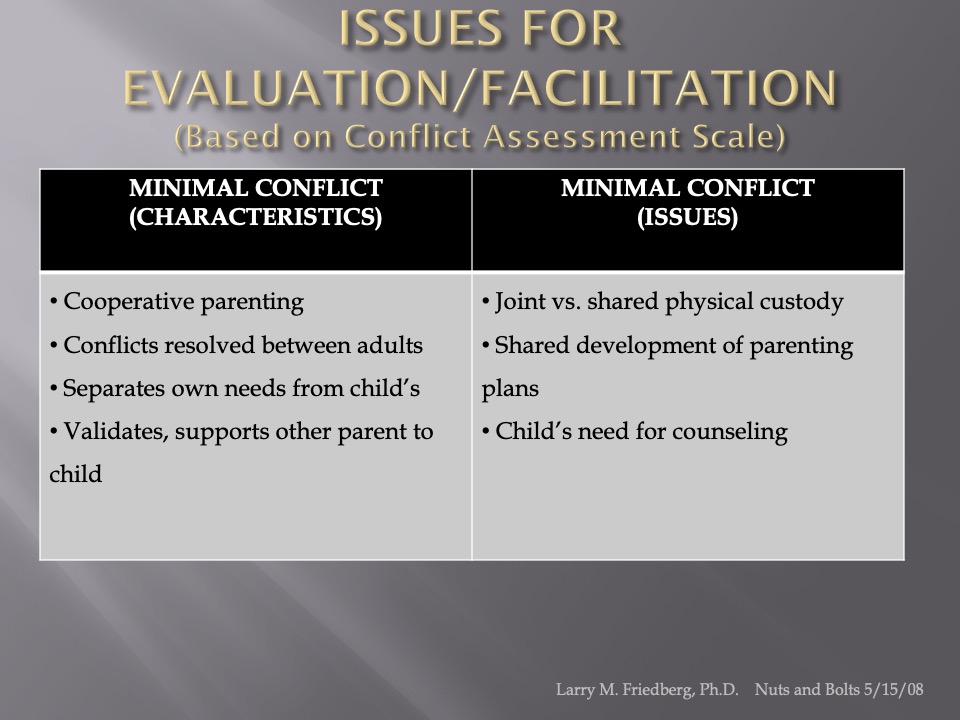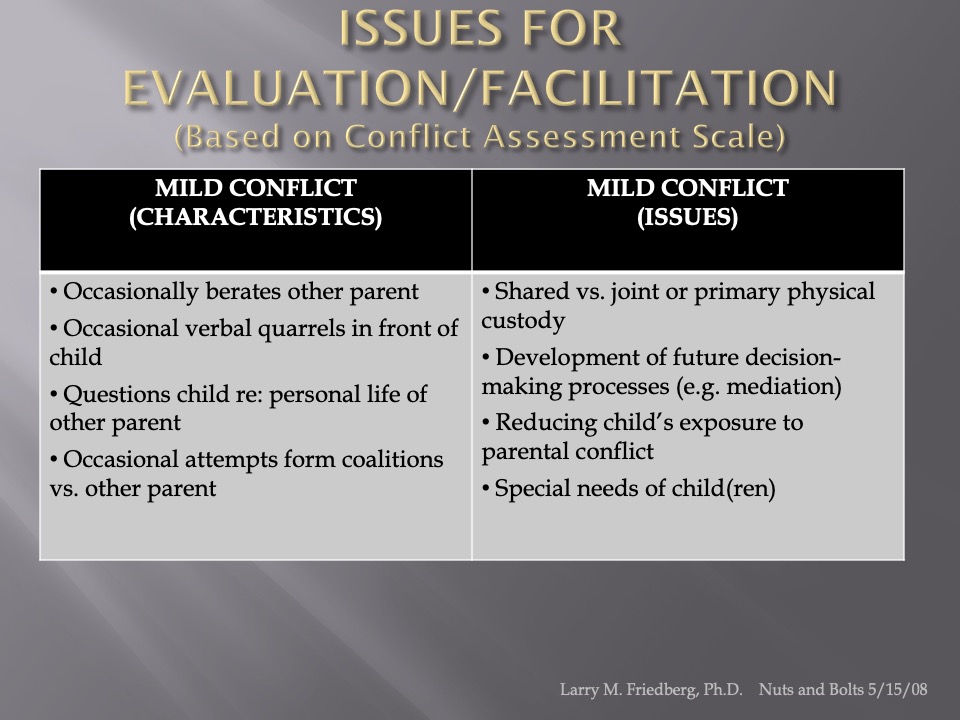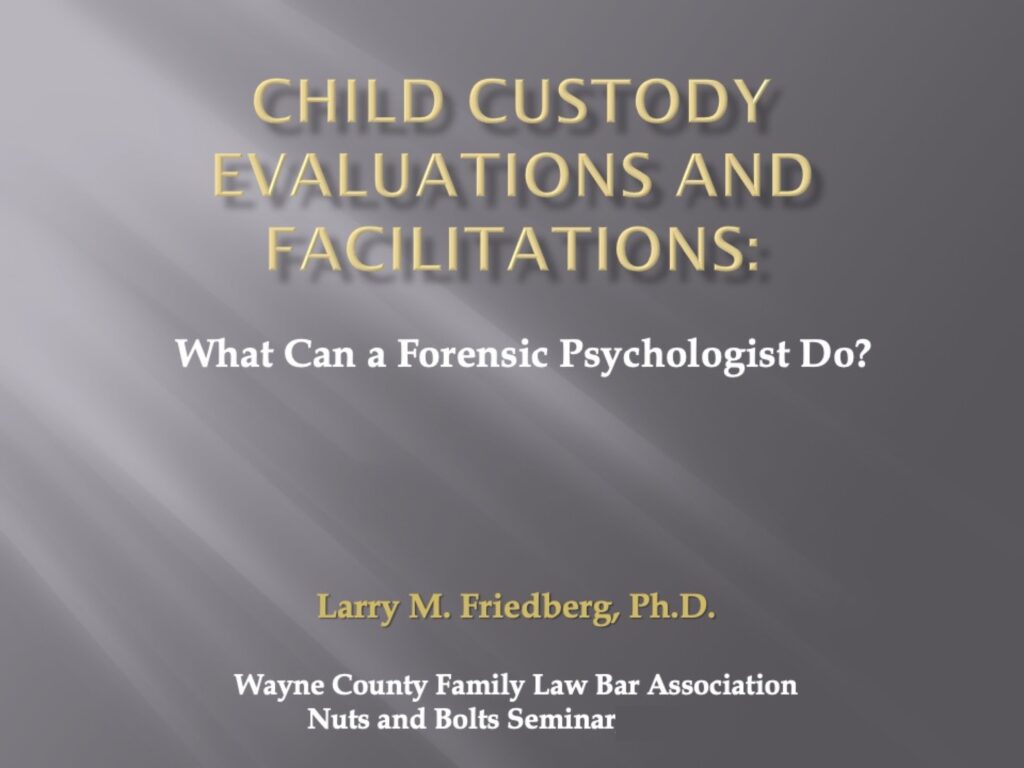Jim Alle called me up with some issues he wanted me to address at this seminar.
Specifically, he asked me my opinions on matters before the divorce judgment, such as my opinions on when to evaluate, when to facilitate, and how do I deal with some issues in evaluations, such as addressing the factors in the Child Custody Act.
What does a forensic psychologist do, and what can we do?
As I thought about this, it came to me that there is a whole spectrum of cases that have come to my attention in the course of a divorce, which I conceptualize along a continuum from those where there is minimal conflict between the parties, to those where is intense conflict and there are numerous problematic issues:

This slide shows a continuum of levels of conflict between parties which can arise in a family law case, adapted from a terrific book, Caught in the Middle (Garrity and Baris, 1997).
At the Minimal Conflict end are cases in which parties can usually agree upon a parenting arrangement and might ask for a mediator to help them answer some specific questions like:
What is a developmentally appropriate solution to their child or children’s needs?
These parents can cooperate and communicate, resolve conflicts and can separate their own needs and relationships difficulties from their children’s needs.
At the far end, in two categories of Intense or Severe Conflict, there are issues of either physical or emotional danger to the child, issues of alienation, of potential exposure to violence, substance abuse or to the parent or parents’ psychological pathology. At this end of the spectrum, a psychologist might be asked to assess the parents with respect to allegations of potential violence or abuse, mental illness, or attempts to alienate the children from the other parent. The psychologist would typically also be asked to recommend a solution, whether in terms of custody, parenting time or other interventions to address these issues.
Lets look at this continuum:

Minimal Conflict
At this end of the spectrum, parents cooperate, communicate, resolve conflicts without involving the children.
Such people don’t need a psychological evaluation.
There may be a dispute about custody, i.e. what to call their arrangement, who wins, what is the best arrangement given the ages of their children.
These are people who often can manage a joint legal/joint physical arrangement, or at least an arrangement with a good deal of shared parenting. Sometimes you get a man who insists that Joint Custody is his right, or a woman who feels that anything other than sole physical custody means that she is admitting that she is an inadequate parent.
Sometimes people are just hung up on words.
These people usually benefit from mediation, and this is what psychologists prefer to do with them. Mediation with these folks is usually successful. A psychological evaluation for them, with testing and consideration of the Custody Act factors, is generally a waste of time.

Mild Conflict
Mild conflict folks are often in the throes of unresolved marital disputes. In most cases their anger and misbehavior is a temporary phenomenon which resolves itself as they work through their hurt, grief and anger over their divorce and other marital disputes. It may take a year or two for them to reach an accommodation to the changes in their lives, but this most often happens
They have some problems, in the crisis context, in modulating what they say about the other parent, or what they do in front of the kids, but their behavior doesn’t get out of control.
What defines them is their ability to make use of advice that putting the kids in the middle or exposing the kids to their conflicts is bad for the kids.
These folks may disagree about what kind of parenting arrangement is best for their kids, and may only be able to communicate with one another with a third party present, but in the presence of this third party, they do much better. Then they get down to important issues like what is a good arrangement for their children, how to prevent or resolve future problems, for example with an agreement to mediate in the future or to use a parenting coordinator when things get sticky.
Again, such people typically don’t need a psychological evaluation. It may be requested, as each party may feel that they should be the primary caregiver for the child, or one parent wants joint custody while the other wants sole custody.
In many such cases, either closed mediation or facilitation should be tried first.
By facilitation I mean that a mental health professional is asked to facilitate an agreement on as many issues as possible and make a recommendation to the court on the remaining issues. Sometimes the order calls the psychologist a parenting facilitator, sometimes a parenting coordinator.
The core principle is to give the parties as much decision-making power as possible, and try to address the unresolved issues. In such cases, the attorneys are usually interested in settling the case, and the court makes the ultimate decisions if either party disagrees with the recommendation.
